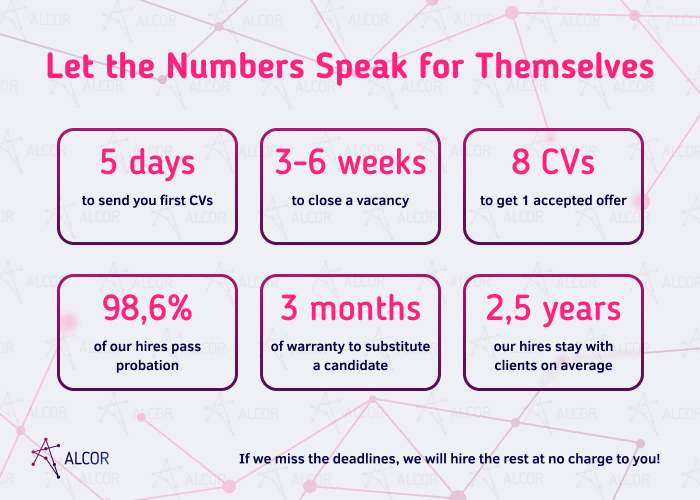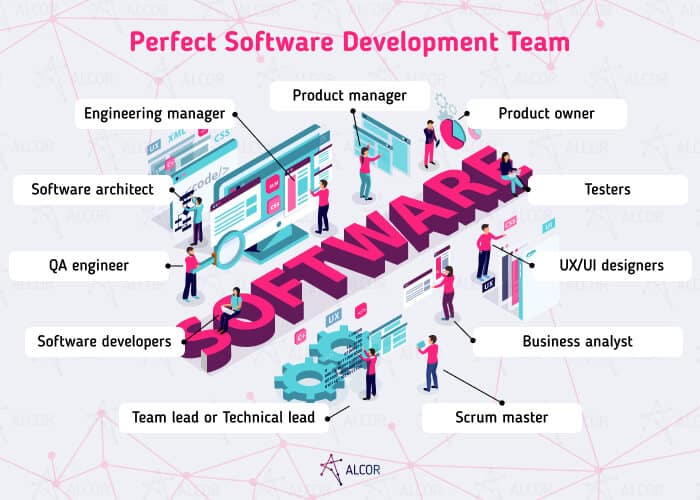Product development is a compound process where tech specialists are at its forefront. The roles within a software development team define the members’ responsibilities, ensure smooth work management, and contribute to overall performance. That’s why savvy managers should orchestrate their teams with precision and aim for win-win team composition.
I’m Sergiy Ovcharenko, CBDO at Alcor, an R&D center provider that can hire developers in Poland, Romania, Mexico, Colombia, and other EE and LATAM countries. In this article, I will focus on every software development role that will help you assemble your perfect team when expanding your horizons abroad. Let the exploration begin!

Typical Team Roles in Software Development
To drive your product to success, you need a team of tech talents that is made up of these key roles:
- Product manager
- Product owner
- Engineering manager
- Software architect
- Software developers
- UX/UI designers
- QA engineer
- Business analyst
- Scrum master
- Testers
- Team lead or Technical lead

It’s important to mention that every team structure has different software development team roles. Thus, project team roles and responsibilities are not the same as in a product team. This article will spotlight the product team structure aligned with Agile fundamentals, as our company specializes in building in-house engineering teams for product tech companies. So, let’s move to the detailed descriptions of specialists you need for your own product team.
10 Roles in a Software Development Team
1. Product Manager
A Product Manager (PM) is the person who oversees the entire development process and steers it towards successful market entry. Their responsibilities cover a vast terrain: crafting and implementing strategies, planning and monitoring product KPIs. PMs typically set the ambitious goal of achieving company targets through their products. For this, they keep a keen eye on competitors, thoroughly analyze the market, generate ideas, and manage pricing policies.
But that’s not all — PMs are the glue that binds the team together. They control and plan tasks, as well as closely interact with developers, a product owner, marketing specialists, sales reps, and stakeholders. Since PMs collaborate with practically everyone, they are also in charge of holding meetings and taking care of meeting facilitation. Their role extends to accepting or rejecting ideas, overseeing technical implementation, and managing documentation and maintenance.
2. Product Owner
Another important role in a software development team is a product owner. This expert is accountable for maximizing the value of a product. To do so, they need to understand the client’s specific needs to define goals and create a cohesive vision for each member of a software development team. It’s not rare for a product owner to wear many hats, like being involved in business strategy, product design, market analysis, and project management. Maybe that’s why they are often confused with project managers and business analysts, even though the latter focus more on the technical aspects of the development process. Product owners, on the other hand, are more into the profitability of the end product.
Among the primary responsibilities of a product owner are:
- crafting a compelling product roadmap,
- maintaining a backlog,
- acting as a liaison between the development team and stakeholders,
- evaluating feedback,
- and ensuring maximum value to the end-users.
This role demands a combination of strategic thinking, practical communication skills, and a deep understanding of both business objectives and end-user needs to guide the team towards successfully creating a high-quality and market-aligned product.
Transform your vision of a revolutionary eco-friendly product into reality by hiring innovators via our GreenTech recruitment agency!
3. Business Analyst
Business Analysts study and gather all information about the product, outline the target audience’s needs, and act as a bonding agent between the market and engineers. They analyze users’ behavior/concerns and then compile product enhancement and development recommendations. As soon as the product is ready, BAs analyze whether this product actually resolves market problems and its importance for end users.
4. Engineering Manager
Software development team roles and responsibilities also presuppose engineering managers. Picture them as conductors who work face-to-face with every team member and gain a deep understanding of the team’s performance dynamics. Notably, their mission goes beyond managing — they cultivate a trustworthy work environment where each team member feels empowered to pitch ideas and share feedback openly.
They also optimize the software development team structure when new developers join the team, plus participate in their coaching. Armed with a solid technical background, these players in the team juggle the responsibility of selecting the best engineering solutions for product realization. They also analyze potential challenges and avert them with the help of tech instruments.
5. Software Architect
This specialist takes the lead in orchestrating the internal arrangement of the software and aligning it with product requirements and available resources. Grounded in business needs, architects outline technical and functional instruments essential for product development. But they aren’t mere planners — architects roll up their sleeves and get hands-on in the development process. Not to mention that they craft the very design of the system.
These experts should have a strategic vision as they plan for software enhancement, extension, and adding new features. A master of optimization, a perfect software architect navigates the complexities to find the optimal technical solutions that align seamlessly with the product.
6. Software Developers
While speaking of important roles in a software development team, programmers cannot go unmentioned. These are the wizards who bring the code to life. They use various programming languages, frameworks, and libraries to make it possible.
Due to their experience, coders have three ranks:
- Junior (1-3 years of experience),
- Middle (3-5 years of experience),
- Senior (7-10+ years of coding).
Software engineers also have certain specializations to be full-stack, front- or back-end developers. They all collaborate closely with other team members, such as designers, testers, product engineers, and other team members. This ensures a seamless parallel workflow where everyone’s expertise intertwines to build exceptional software.
7. UX/UI Designers
Among the key roles in the software development team are also UX/UI designers. User experience (UX) and user interface (UI) may be distinct but harmoniously intertwined. Both demand a blend of creativity and technical prowess.
UX designers ensure the browsing experience and features are accessible to users. They meticulously analyze the target audience’s behavior to sculpt an interface that guides users effortlessly through the product.
On the other hand, UI designers are the visual maestros who shape the layout and design elements. Fonts, colors, forms, sounds, and animations are their instruments in crafting a visually appealing and intuitive interface. Although these are two team roles in a software development process, the UX/UI designer often wears both hats.
8. QA Engineer
Another common role in the software development team is a QA engineer. These specialists are the guardians of product quality. These experts often enter users’ shoes to identify whether the software works properly and meets quality standards. They also stay active throughout the entire development process to see its weaknesses for improvement and supervise the testing process.
Quality assurance automation engineers must be aware of the testing theory and types as well as have coding skills. QAs test the software with the help of the script they have written, automating the testing process. After this, they conduct some analytics and compile a bug report — describing all actions that led to this or that bug. A well-written piece saves plenty of time and prevents the developer from making further mistakes.
9. Scrum Master
Following agile principles, these specialists apply scrum ideas to guide the team. Their role is dynamic and multifaceted — from organizing daily stand-ups and gathering feedback to conducting one-to-ones. They also iron out the obstacles that hinder a team’s performance and progress.
Operating within the Scrum methodology, scrum masters play a pivotal role in:
- sprint planning,
- determining durations, and
- outlining tasks for each cycle.
They meticulously control the backlog during sprints, utilizing boards like Trello or Jira. After this, the scrum master and development team overview and analyze the previous sprint, considering all pitfalls and successfully completed tasks. This sets the stage for defining the next sprint, and the cycle repeats. Motivating the team and fostering communication among its members also fall within the broad spectrum of a scrum master’s duties.
Curious how to build a tech team through a Build-Operate-Transfer model? Read our article!
10. Testers
Roles of team members in software development also include testers. In a nutshell, they are responsible for the proper functioning of the product. Testers take the manual helm during the testing stage, meticulously identifying potential software defects, bugs, or any issues that might vex an end-user. After product testing, they compile detailed reports with recommendations for improvements.
Other responsibilities include:
- reviewing test plans,
- assessing and analyzing product specifications and requirements,
- and mapping out testing strategy.
Technical testers in the crew also construct test environments or provide support to network management staff and system administrators.
11. Team Lead or Tech Lead
These roles of team members in software development cover two essential spheres — technical & people management. The tech lead is an experienced programmer who takes the helm of tech tasks. Their responsibilities include:
- reviewing the code,
- enhancing the team’s technical skills through mentoring,
- and addressing practical problems that arise during the development stage.
Team leaders, in turn, prioritize the tasks, maintain cross-team connections, and orchestrate the overall working process. To allocate the tasks reasonably, team leads must be well-versed in the roles and responsibilities of a software development team. They also boost team motivation & morale, give feedback, and cover routine questions about vacations/days off. As you might surmise, these two roles are about being a leader from different perspectives.
Tips for Building a Perfect Software Development Team
-
Have a Clear Vision
Every great team starts with a manager who profoundly understands the company’s mission and goals. If you’re embarking on the journey of starting an IT business, the first step is to chart the map of your company’s purpose and envision the future product. This strategic exercise not only defines your mission but also helps identify the size and structure of the team necessary to turn your aspirations into reality.
For those overseeing a mature business with ambitions to expand abroad, a critical assessment of your current development team is in order. Identify talent gaps, evaluate existing workload, and carefully examine plans for product enhancement to discern the specific software development and implementation team roles required.
-
Prioritize Hiring T-shaped Programmers
Then, you can move on to filling different roles in your software development team. As you probably know, the workforce can be divided into two categories based on their skills — generalists and specialists. My advice is to get the best of both worlds and focus on hiring generalists who possess specialties. Such experts are usually called T-shaped developers. Not only do they have in-depth technical knowledge and hands-on coding experience, but also demonstrate advanced collaborative abilities, emotional intelligence, proactivity, empathy, and problem-solving skills.
The best way to find and identify such software engineers is via an experienced IT recruitment agency. This is what a product company Ledger did when they set sights on scale-up abroad. They aimed to assemble a QA team of at least 10 engineers to elevate their hardware wallets for cryptocurrencies. After turning to Alcor for professional support, Ledger secured a top-tier tech team and gained comprehensive legal and compliance coverage — all wrapped up with the bow of ultimate transparency.
-
Set Ambitious Yet Realistic Goals for Your Developers
Having business goals is a no-brainer, but you shouldn’t overlook the real MVPs of your success — your software engineers. Getting a handle on each team member’s career dreams is crucial while keeping an eye on the whole development team’s growth. Think about using the SMART approach for setting goals for software engineers. You’ve got a buffet of choices: career, technical, interpersonal, leadership, and community goals, which can be divided into long-term and short-term ones.
-
Establish Clear Communication
Clear and constant communication is a cornerstone of a highly productive and successful development team. This holds even truer for remote teams that miss the luxury of instant communication. Video conferencing, messaging apps, and team management tools can come in handy.
It’s essential to have weekly department meetings to keep the whole squad in the loop on current tasks. And those monthly one-on-one calls? They’re your ticket to building strong connections with each team member. In these moments, you delve into progress, serve up feedback, and face challenges head-on. Remember, constructive feedback and transparency are the dynamic duo that crafts a trustful and productive workspace.
-
Create a Pleasant Work Environment
The software development process can be quite overwhelming, exacerbated by the risk of burnout from working overtime. According to the report by Haystack Analytics, the pandemic increased burnout cases in 81% of software developers. This led to decreased performance, a lack of motivation, and even instances of quiet quitting. As a manager, it becomes crucial to prioritize and create a healthy work-life balance for your programmers. This may include flexibility in working hours, fair compensation adjustments, enhanced benefits packages, and providing growth opportunities.
Opt for software development in Ukraine and save up to 60% on expenses while offering a generous benefit package. Contact us for details!
Another thing to consider is corporate culture. According to Eagle Hill’s survey, 76% of workers believe culture significantly influences efficiency. Therefore, focus on clearly defining your company’s mission, core values, and goals and promoting transparency. This attracts top talent and improves retention, creating a positive and thriving work environment.
-
Work on Team Cohesion
Transparent communication is the cornerstone of a tightly-knit team, forming the first brick in the foundation of success. You should view your development team as a unit, much like players in baseball or basketball, where “all for one and one for all.”
Team cohesion fosters trust, mutual accountability, swift conflict resolution, and a support system. To establish this unity, prioritize effective teamwork. Engage your programmers in team-building activities, reinforce the idea of a “we” mentality, promote mutual accountability, and share victories and losses as a collective.
Consider Alcor BPO Your Trusted Partner in Hiring a Software Development Team
If you’re steering an IT business, Alcor has your back in building a top-notch tech team for software development in Latin America. We know the ins and outs of the IT Services market in Latin America and can hire software developers in Argentina, Mexico, Colombia, and Chile. Or maybe you’re feeling the Eastern European vibe? We’ve got you covered! Alcor will hire developers in Slovakia, Poland, Ukraine, or Romania. In addition, we have a broad specialization, ranging from Fintech and Blockchain to AgriTeech and PropTech recruitment.
With almost a decade of experience in team assembly, our 40 software engineer recruiters are pros at finding and hiring the perfect candidates. We don’t just look at technical chops; we consider soft skills, English proficiency, and cultural fit. The result? We often wow our clients, as 4 out of 5 candidates are usually invited for an interview and 98,6% shine during probation.
But wait, there’s more! We’re not just about IT recruitment; we’ve got your business sheltered for building a dedicated development center. Alcor takes care of all legal and compliance matters plus back-office operations, including IT infrastructure setup, payroll management, office leasing, consulting on taxation, insurance packages, and payscale.

One of our clients, a US-based IT company, Dotmatics, is a vivid example of how our solution works wonders. With our recruitment process outsourcing service and back-office support, our client got an R&D team of 30 programmers in a year that compliantly functions in Eastern Europe.
So, now that you have a fuller picture of the key roles in a software development team, don’t hesitate to build your own research and development center abroad. Alcor will be pleased to guide you in this process!
FAQ
How many roles are there in a software development team?
A well-organized development team has nearly 10 key positions. They include implementation and software development team roles like software developers, QA engineers, product manager, software architect, and designers, etc.
What roles are a must for a software development team?
For proper and trouble-free product development, the team must include a product manager, team lead, and the core development team (software engineers, quality assurance specialists & designers).
How should I build a software development team?
To assemble a good team, you should think about the software development team structure first. For this, tech entrepreneurs must consider the following aspects: the management methodology, budget, scope of work, plus roles & responsibilities in the development team.
What are the main roles in a software development team?
A software development team is made up of these key roles: product manager, engineering manager, software architect, software developers, designers, testers, and team / tech leads.
